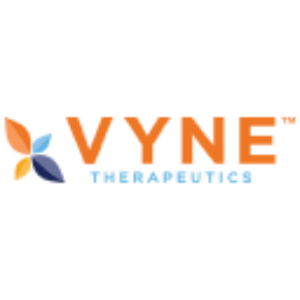VYNE Therapeutics Announces Positive Biomarker Data from Successful Phase 1b Trial of VYN201 for the Treatment of Vitiligo
- VYN201 demonstrated positive effect on key biomarkers relevant to vitiligo
- Data supports VYN201’s rapid onset of action and previously announced positive clinical results
- Program is on track for Phase 2b initiation in Q2
BRIDGEWATER, N.J., Jan. 10, 2024 (GLOBE NEWSWIRE) -- VYNE Therapeutics Inc. (Nasdaq: VYNE) (“VYNE” or the “Company”), a clinical-stage biopharmaceutical company developing proprietary, innovative and differentiated therapies for the treatment of immuno-inflammatory conditions, today announced new biomarker data from the previously completed Phase 1b trial in patients with nonsegmental vitiligo. The data show that BET inhibitor, VYN201, had a positive effect on multiple disease-associated biomarkers.
Positive clinical data from the Phase 1b trial were announced in October 2023. The trial was a 16-week open-label study assessing the safety, tolerability, pharmacokinetics, and exploratory efficacy of once-daily topical VYN201 in 29 patients with a clinical diagnosis of active nonsegmental vitiligo, in three dose cohorts (
Results from the biomarker analyses include the following:
- Downregulation of Matrix metalloproteinase-9 (MMP-9) levels: VYN201 induced the downregulation of MMP-9 in biopsied lesional skin after 8 weeks of treatment compared to baseline. MMP-9 is an inflammatory biomarker associated with the detachment and subsequent loss of melanocytes from skin in vitiligo and is elevated in patients with vitiligo. At Week 8, there was a median reduction in MMP-9 of
40.8% in lesional skin compared to baseline for subjects in the2.0% cohort. - Upregulation of melanocyte-related transcription factors (MRTFs): VYN201 induced the upregulation of multiple MRTFs, including SRY-box transcription factor 10 (SOX10), Lymphoid-enhancing factor-1 (LEF1), β-Catenin and Microphthalmia associated transcription factor (MITF), after 8 weeks of treatment compared to baseline. Each of these markers are linked to the proliferation of melanocytes, recovery in melanogenesis, and subsequent re-pigmentation of skin. In the
2.0% cohort, SOX10, LEF1, β-Catenin and MITF transcription factors had median increases of36.1% ,90.2% ,16.5% and15.2% in their respective expression levels in lesional skin compared to baseline.
“VYN201’s potential to reduce melanocyte detachment by downregulating MMP-9 and by upregulating the expression of proteins relevant to melanocyte proliferation and melanogenesis is promising, and I look forward to the continued advancement of VYN201 as a potential differentiated therapy for vitiligo,” said Amit Pandya, M.D., former President of the Global Vitiligo Foundation and Dermatologist, Department of Dermatology, Palo Alto Foundation Medical Group.
“We are encouraged by these new biomarker data from the Phase 1b trial for VYN201, building on our recently announced positive clinical results,” said David Domzalski, President and CEO of VYNE. “We’ve made considerable progress in advancing this program, and we look forward to initiating a Phase 2b trial evaluating VYN201 in patients with both active and stable nonsegmental vitiligo in the second quarter of this year.”
About MMP-9
The loss of functional melanocytes in vitiligo is associated with the generation of inflammatory mediators that facilitate melanocyte detachment in skin.1 This cellular detachment occurs due to the disrupted surface distribution of adhesion molecule E-cadherin and the release of soluble E-cadherin.2 E-cadherin cleavage may be induced by several metalloproteinases including MMP-9. MMP-9 is secreted by the keratinocytes in response to various proinflammatory cytokines such as IFN-γ and TNF-α.3
About the Wnt/β-catenin pathway
The Wnt/β-catenin pathway plays an essential role in pigmentation by regulating both melanocyte differentiation and melanogenesis through the action of MITF.4 β-catenin is increased by the binding of Wnt proteins to their receptors, leading to transport of β-catenin into the nucleus, where it regulates transcription of MITF through interactions with several transcription factors that include LEF1 and SOX10. MITF also regulates transcription of downstream genes key for melanin synthesis and melanocyte cell development.
About Vitiligo
Vitiligo is a chronic autoimmune depigmenting disorder of the skin, characterized by the loss of pigment producing cells known as melanocytes. Vitiligo is the most common depigmenting skin condition, with a prevalence estimated at 0.5
About VYN201
VYN201 is a pan-bromodomain BET inhibitor designed to be locally-administered as a “soft” drug to address diseases involving multiple, diverse inflammatory cell signaling pathways while providing low systemic exposure. To date, VYN201 has produced consistent reductions in pro-inflammatory and disease-related biomarkers and improvements in disease severity, and demonstrated local activity in several preclinical models (using several different routes of administration).
About BET Inhibitors
BET proteins play a key role in regulating gene transcription via epigenetic interactions (“reading”), and recent research has determined a key role for these proteins in regulating B cell and T cell activation and subsequent inflammatory processes. As epigenetic readers, BET proteins regulate the recruitment of transcriptional factors that are key to the production of several pro-inflammatory cytokines. BET inhibitors have the potential to treat a range of immuno-inflammatory and fibrotic diseases by blocking pro-inflammatory cytokine transcription with additional potential in myeloproliferative neoplastic disorders.
1. Picardo, M. et al. Nat. Rev. Dis. Primer 1, 15011 (2015).
2. Delmas, V. & Larue, L. Exp. Dermatol. 28, 662–666 (2019).
3. Boukhedouni, N. et al. JCI Insight 5, 133772 (2020).
4. Zhao SJ et al, Clin Cosmet Investig Dermatol. Sep 1;14:1089-11031 (2021).
5. Rosmarin et al, Lancet (2020);396:110-120.
About VYNE Therapeutics Inc.
VYNE’s mission is to improve the lives of patients by developing proprietary, innovative and differentiated therapies for the treatment of immuno-inflammatory conditions. The Company’s unique and proprietary bromodomain & extra-terminal (BET) domain inhibitors, which comprise its InhiBET™ platform, include a locally administered pan-BD BET inhibitor (VYN201) and an orally available BD2-selective BET inhibitor (VYN202) that were licensed from Tay Therapeutics Limited.
For more information about VYNE Therapeutics Inc. or its product candidates, visit www.vynetherapeutics.com. VYNE may use its website to comply with its disclosure obligations under Regulation FD. Therefore, investors should monitor VYNE’s website in addition to following its press releases, filings with the U.S. Securities and Exchange Commission, public conference calls, and webcasts.
Cautionary Statement Regarding Forward-Looking Statements
This release includes forward-looking statements within the meaning of the Private Securities Litigation Reform Act of 1995, including, but not limited to, statements related to the initiation of a Phase 2b trial in the second quarter of 2024, the potential benefits of VYN201 and the potential of VYN201 as a differentiated therapy for vitiligo. All statements in this press release which are not historical facts are forward-looking statements. Any forward-looking statements are based on VYNE’s current knowledge and its present beliefs and expectations regarding possible future events and are subject to risks, uncertainties and assumptions that could cause actual results to differ materially and adversely from those set forth or implied by such forward-looking statements. These risks and uncertainties include, but are not limited to: VYNE’s ability to successfully develop its product candidates; the timing of commencement of future preclinical studies and clinical trials; VYNE’s ability to complete and receive favorable results in, clinical trials for its product candidates; VYNE’s intentions and its ability to obtain additional funding, either through equity or debt financing transactions or collaboration arrangements; and VYNE’s ability to comply with various regulations applicable to its business. For a discussion of other risks and uncertainties, and other important factors, any of which could cause VYNE’s actual results to differ from those contained in the forward-looking statements, see the section titled “Risk Factors” in VYNE’s Annual Report on Form 10-K for the year ended December 31, 2022, Quarterly Report on Form 10-Q for the quarter ended September 30, 2023, and VYNE’s other filings from time to time with the U.S. Securities and Exchange Commission. Although VYNE believes these forward-looking statements are reasonable, they speak only as of the date of this announcement and VYNE undertakes no obligation to update publicly such forward-looking statements to reflect subsequent events or circumstances, except as otherwise required by law. Given these risks and uncertainties, you should not rely upon forward-looking statements as predictions of future events.
Investor Relations:
John Fraunces
LifeSci Advisors, LLC
917-355-2395
jfraunces@lifesciadvisors.com
Tyler Zeronda
VYNE Therapeutics Inc.
908-458-9106
Tyler.Zeronda@vynetx.com








